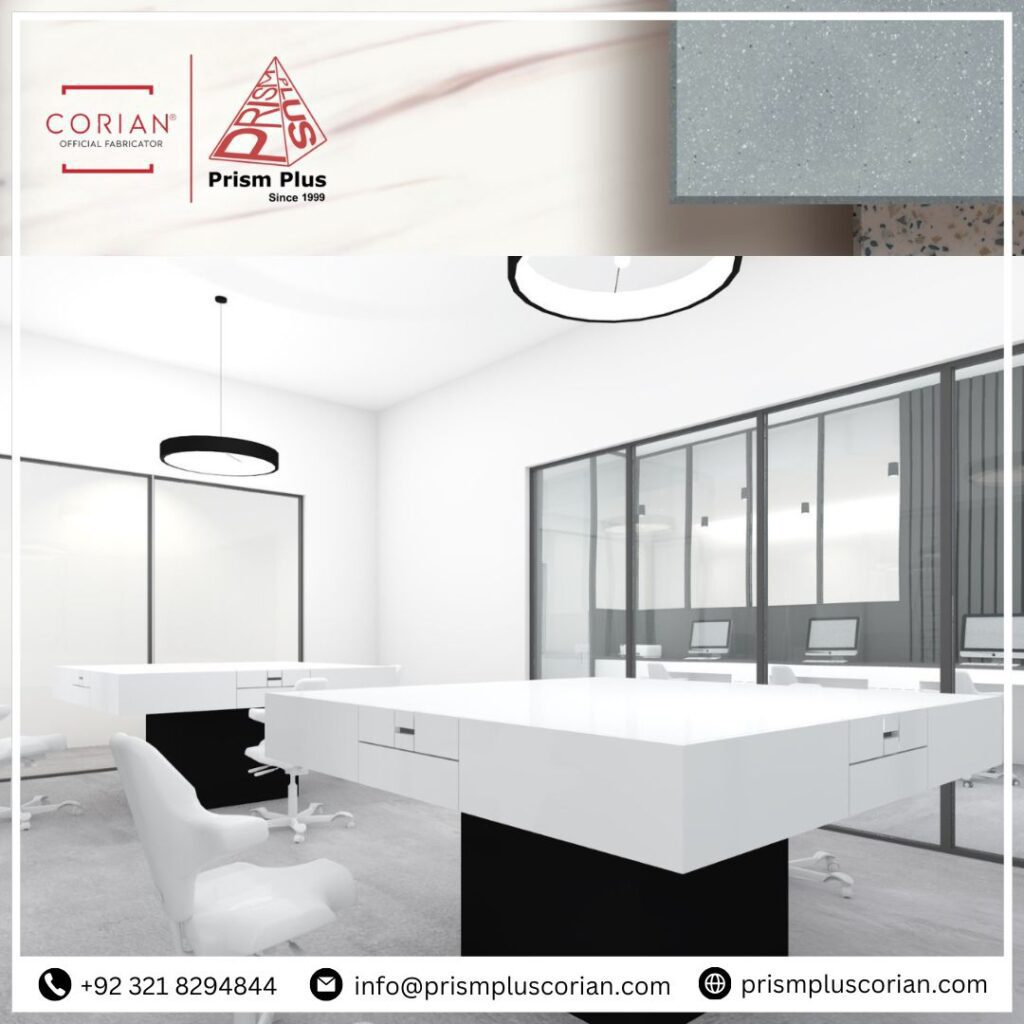You’ve heard the name. You’ve seen the finish. Maybe in a luxury kitchen, a sleek bathroom, or the reception desk of a five-star hotel. But what exactly is Corian, and why has it become a benchmark for modern, hygienic, and long-lasting surface design?
In this blog, we take you behind the material — its composition, advantages, use cases, and why architects, designers, and homeowners are increasingly making Corian their go-to choice for premium interiors.
What Exactly is Corian?
Corian is a solid surface material invented by DuPont in the 1960s. It’s composed of acrylic polymer and natural minerals (mostly aluminum trihydrate derived from bauxite ore).
What makes it different is not just its appearance — but its functional superiority over traditional materials like wood, granite, tile, and even quartz in certain applications.
The material is:
- Seamless
- Non-porous
- Custom-moldable
- Highly durable
- Easy to repair and maintain

Corian is Not a Brand. It’s a Benchmark.
Although “Corian” is technically a brand name (DuPont’s proprietary material), over time, it has become a generic reference for solid surfaces — much like “Xerox” became a synonym for photocopying.
Other popular solid surface brands include:
- HI-MACS (LG)
- Staron (Samsung)
- Hanex
- Krion
Still, Corian remains the gold standard in both residential and commercial installations globally.
Where is Corian Used?
The versatility of Corian is its biggest strength. You’ll find it in:
- Modular Kitchens: Countertops, backsplashes, islands
- Bathrooms: Vanity tops, integrated sinks, wall panels
- Retail & Hospitality: Counters, bars, reception desks
- Medical Clinics & Labs: Operating room surfaces, walls
- Office Spaces: Workstations, table tops, coffee bars
- Restaurants & Cafés: Service counters, furniture
- Transportation: Airports, ship cabins, train washrooms
Because of its hygienic and seamless nature, it’s also widely used in hospitals and food service areas where sanitation is critical.
What Makes Corian a Better Choice?
1. Seamless Aesthetic
Corian can be joined nearly invisibly, offering an uninterrupted surface. Ideal for creating modern, minimalist looks without grout lines or joint gaps.
2. Non-Porous & Hygienic
Water, oils, bacteria — none of it seeps in. This makes Corian easy to sanitize and perfect for places where cleanliness is non-negotiable.
3. Moldable & Flexible
It can be thermoformed into curves, waves, or unique geometric designs. Unlike granite or quartz, Corian can bend, fold, and flow into creative forms.
4. Repairable & Renewable
Scratches, minor chips, or burns can be sanded or refinished — restoring it to original condition. With basic care, Corian surfaces can last decades.
5. Wide Design Palette
From plain white to marble patterns, solid colors to translucent effects, Corian offers over 100 color and texture options — suitable for any design theme.
What’s the Difference Between Corian and Quartz?
| Feature | Corian | Quartz |
|---|---|---|
| Composition | Acrylic + Minerals | Natural Quartz + Resin |
| Seamless Joints | Yes | No |
| Non-porous | Yes | Yes |
| Heat Resistance | Moderate | High |
| Design Flexibility | High (thermoformable) | Low |
| Repairable | Yes (buff/sand) | Limited |
| Outdoor Use | Limited | Better |
Conclusion? Quartz is great for durability & heat, but Corian wins for design, hygiene, and flexibility.
Environmental Benefits
Corian is available in eco-friendly variants that include recycled content and can contribute to LEED certifications. Its longevity and renewability also make it a low-waste material, unlike laminates or tiles that need replacing.
Some product lines even use post-consumer recycled materials and water-based adhesives, promoting sustainable design.
How Much Does Corian Cost?
Pricing varies depending on brand, color, and design complexity. On average (in Pakistan or UAE):
- Basic white/local Corian sheets: PKR 2,000–2,800/sq. ft.
- Imported Corian (DuPont or Staron): PKR 3,500–5,000/sq. ft.
- Custom fabricated Corian installations: Quoted per project.
Always ask for:
- Original sheet brand name
- Warranty terms
- Sample works
- Professional installation
Who Should Use Corian?
Architects looking to push design boundaries
Homeowners building modern kitchens or bathrooms
Clinics and hospitals prioritizing hygiene
Restaurants aiming for low-maintenance stylish interiors
Retail brands creating high-impact store displays
Basically, anyone who values form, function, and hygiene — all in one material.
Final Thought: Corian Isn’t Just a Surface — It’s a Statement
From medical-grade cleanliness to sculptural furniture, Corian adapts to your vision. It’s not just about aesthetics — it’s about surfaces that last, perform, and enhance the experience of space.
If you‘re planning your next interior upgrade — think beyond tiles and laminates. Think Corian.

